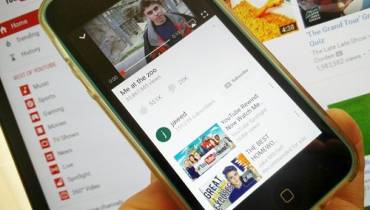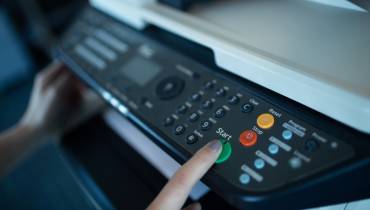10 Reasons People Fail at Basic Email Etiquette (& How to Charm With Yours)

In this digital age, who doesn’t use email? All of use use email. And yet, according to business etiquette expert Barbara Pachter, many people still don't know how to use email appropriately.
Many of us end up making embarrassing mistakes that could be detrimental to our personal and professional lives.
People often write email like the recipient is privy to our inner thoughts and our non-verbal cues like facial expressions they’d see if we were speaking to them in person.
Fortunately, there is much you can do to keep the convenience of email, while reducing the risks. Here are ten ways people fail at basic email etiquette and how to avoid it and charm with yours:
1. People write like a robot
Email is just another way of communicating with another human being. That means you still need to create some kind of connection. However, many people forget that and write email hurriedly just to cross it off their to-do list. That habit can bring problems, especially in business interactions.
Create some kind of connection in your emails by matching the sender’s tone. If someone is informal and friendly in their email, reply in the same tone. Likewise, if they adopt a more formal approach, match it.
Moreover, personalize your emails. That might be something as small as a “P.S” at the end of an email. Keep in mind also that sending all your emails from a sender address like: No-reply@businessmail.com, can be interpreted to mean “I don’t care about you.”
2. They don’t respond to email, ever
Marion Elizabeth Rodgers, author of “Mencken: The American Iconoclast” explains how her subject, the journalist and essayist H. L. Mencken (1880-1956), believed that if someone wrote to you, writing back was, in his words, “only decent politeness.”
Even in this digital age characterized by email overload, it’s always recommended to try and respond to email as much as you can. Most of us are not prominent persons and our inboxes, thankfully, will never become quite so crowded with nonspam messages. And even if you are a prominent person, you don’t have to reply to email yourself. You can appoint someone to do that for you, such as a secretary.
Failing to respond to email jars. “If I write to a man on any proper business and he fails to answer me at once, I set him down as a boor and an ass,” Mencken reportedly explained. He is said to have replied to all letters mailed to him. And his letters were “exceptional not only in quantity, but in quality: witty gems that the recipients treasured,” writes author Randall Stross in an article on The New York Times.
When it comes to email etiquette, try and adhered to the most basic of social principles: reciprocity. “Mencken’s 100,000 letters serve as inspiration: we can handle more email than we think we can, but we should do so by attending to it only infrequently, at times of our own choosing,” Stross stresses.
3. They try to unnecessarily be funny in email
Without the right facial expressions and tonal variations, humor can easily get lost in translation. Many people don’t realize this and try to be funny in their email.
Be cautious with humor. In a professional exchange, it's best to leave humor out of emails unless you know the recipient very well. After all, something that you think is funny might not be funny to someone else.
Pachter advices: "Something perceived as funny when spoken may come across very differently when written. When in doubt, leave it out."
4. They write email that could be mistaken for a novel
Emails that run to two, three or more screens hardly get the response the sender wants. That’s because they are often what Mark Cuban would call “the ‘I want’ variety” or the kind of letters Thomas Edison called “begging letters.” At best, they confuse matters; at worst, they’re ignored.
Keep to one screen if you can. In fact, if you find your message becoming too long or you find yourself agonizing for over an hour or so, consider picking up the phone. Email is not always the best way to communicate sensitive or complex issues.
5. They waste time with one word emails
Many people are guilty of sending one word emails, such as “Thanks,” “Great” or “Hello.” Consider carefully whether it is really necessary to send (and possibly overburden) colleagues, clients or friends with unnecessary one word emails.
For many professionals including writers, entrepreneurs and freelancers in a business setting, time is money. They might not appreciate wasting time by checking their email only to find a message that says "Hello” or “Thanks.”
6. They fail to proofread every message
In most cases, your grammar mistakes won’t go unnoticed by the recipient of your email. “And, depending upon the recipient, you may be judged for making them," Pachter says.
Don't rely on spell-checkers. Read through your email a few times, preferably aloud, before sending it off to make sure it is comprehensible to the recipient.
"One supervisor intended to write 'Sorry for the inconvenience.' But he relied on his spell-check and ended up writing 'Sorry for the incontinence,'" warns Pachter.
7. They get too excited and overuse acronyms, emoticons and exclamation points
Hey!!! If you are trying to exclaim in your email, just one exclamation mark is enough to convey your excitement. If you are not trying to exclaim in your email, avoid the exclamation point altogether.
“People sometimes get carried away and put a number of exclamation points at the end of their sentences. The result can appear too emotional or immature," Pachter says. "Exclamation points should be used sparingly in writing.”
Also, with the advent of acronyms like omg, btw, lol it’s easy to let proper grammar fall by the wayside. Avoid such shorthands too when communicating with business contacts and, depending on who, some personal contacts.
And use emoticons sparingly. The only emoticon typically accepted in business emails is the standard smiley face :)
8. They use misleading, bland or boring subject lines
Some people (of questionable character) are guilty of email spoofing, which is sending emails with the header designed to appear to come from a known or trusted source. Email spam and phishing methods typically use spoofing to mislead the recipient about the true message origin. That is simply wrong.
Be truthful. Don’t mislead with subject lines, and try not to come across as bland or boring either. Even if it’s just a notification, it’s not okay for your subject line to read: “Notification: The Event that was going to happen won’t happen.” You can be a little more creative than that.
Add a brief, clear and direct subject line that is truthfully descriptive of the core contents of your message. For example, you could include a subject line that reads: "Quick question about your App," "Suggestions for a news story" or “Meeting date changed."
"People often decide whether to open an email based on the subject line," Pachter says. "Choose one that lets readers know you are addressing their concerns or business issues."
9. They leave out the salutation
Let’s face it, we are all sensitive souls. You will always feel a little knocked back if you address someone with a spirited “Dear Jane” or “Hi John,” only to get a flat reply starting simply with “Jane” or “John.” And yet many of us make this seemingly small error repeatedly in email. We sometimes even leave out the salutation or sender’s name entirely.
Email might be a fairly new invention, and we’re still not quite sure what conventions to adopt, but politeness should be a given. Address customers the way they address you. It’s safest and polite that way.
10. They don’t match the sender’s sign off
It’s puzzling how an increasing number of people are either ignoring the email sign off, or signing off with just “Best.” Best what? Leaving your sign-off half baked or mismatched doesn’t really augur well for your image. So, again, match the recipient’s tone and level of formality.
“Best regards” or “Kind regards” are both good sign offs. But if someone has written “cheers,” you can reply likewise. If you’re writing the first email and you’ve never spoken to the person before, it's recommended you start off fairly formally – you can always adopt a more casual tone later if they do.








![[node:title]](/sites/default/files/styles/video_thumbnail_bottom/public/Facebook-Group-Admin-Screening-Update.jpg?itok=x4McnF0Z)











